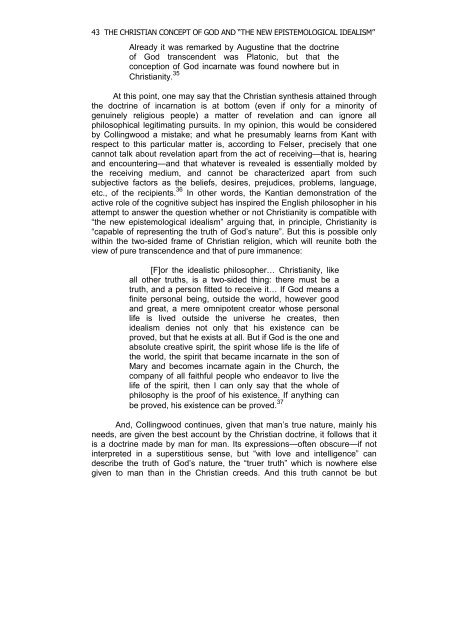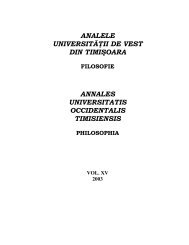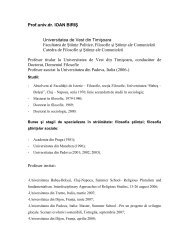VOL. IV (XXI) 2009 - Departamentul de Filosofie si Stiinte ale ...
VOL. IV (XXI) 2009 - Departamentul de Filosofie si Stiinte ale ...
VOL. IV (XXI) 2009 - Departamentul de Filosofie si Stiinte ale ...
You also want an ePaper? Increase the reach of your titles
YUMPU automatically turns print PDFs into web optimized ePapers that Google loves.
43 THE CHRISTIAN CONCEPT OF GOD AND “THE NEW EPISTEMOLOGICAL IDEALISM”<br />
Already it was remarked by Augustine that the doctrine<br />
of God transcen<strong>de</strong>nt was Platonic, but that the<br />
conception of God incarnate was found nowhere but in<br />
Christianity. 35<br />
At this point, one may say that the Christian synthe<strong>si</strong>s attained through<br />
the doctrine of incarnation is at bottom (even if only for a minority of<br />
genuinely religious people) a matter of revelation and can ignore all<br />
philosophical legitimating pursuits. In my opinion, this would be con<strong>si</strong><strong>de</strong>red<br />
by Collingwood a mistake; and what he presumably learns from Kant with<br />
respect to this particular matter is, according to Felser, precisely that one<br />
cannot talk about revelation apart from the act of receiving—that is, hearing<br />
and encountering—and that whatever is reve<strong>ale</strong>d is essentially mol<strong>de</strong>d by<br />
the receiving medium, and cannot be characterized apart from such<br />
subjective factors as the beliefs, <strong>de</strong><strong>si</strong>res, prejudices, problems, language,<br />
etc., of the recipients. 36 In other words, the Kantian <strong>de</strong>monstration of the<br />
active role of the cognitive subject has inspired the English philosopher in his<br />
attempt to answer the question whether or not Christianity is compatible with<br />
“the new epistemological i<strong>de</strong>alism” arguing that, in principle, Christianity is<br />
“capable of representing the truth of God’s nature”. But this is pos<strong>si</strong>ble only<br />
within the two-<strong>si</strong><strong>de</strong>d frame of Christian religion, which will reunite both the<br />
view of pure transcen<strong>de</strong>nce and that of pure immanence:<br />
[F]or the i<strong>de</strong>alistic philosopher… Christianity, like<br />
all other truths, is a two-<strong>si</strong><strong>de</strong>d thing: there must be a<br />
truth, and a person fitted to receive it… If God means a<br />
finite personal being, out<strong>si</strong><strong>de</strong> the world, however good<br />
and great, a mere omnipotent creator whose personal<br />
life is lived out<strong>si</strong><strong>de</strong> the universe he creates, then<br />
i<strong>de</strong>alism <strong>de</strong>nies not only that his existence can be<br />
proved, but that he exists at all. But if God is the one and<br />
absolute creative spirit, the spirit whose life is the life of<br />
the world, the spirit that became incarnate in the son of<br />
Mary and becomes incarnate again in the Church, the<br />
company of all faithful people who en<strong>de</strong>avor to live the<br />
life of the spirit, then I can only say that the whole of<br />
philosophy is the proof of his existence. If anything can<br />
be proved, his existence can be proved. 37<br />
And, Collingwood continues, given that man’s true nature, mainly his<br />
needs, are given the best account by the Christian doctrine, it follows that it<br />
is a doctrine ma<strong>de</strong> by man for man. Its expres<strong>si</strong>ons—often obscure—if not<br />
interpreted in a superstitious sense, but “with love and intelligence” can<br />
<strong>de</strong>scribe the truth of God’s nature, the “truer truth” which is nowhere else<br />
given to man than in the Christian creeds. And this truth cannot be but




